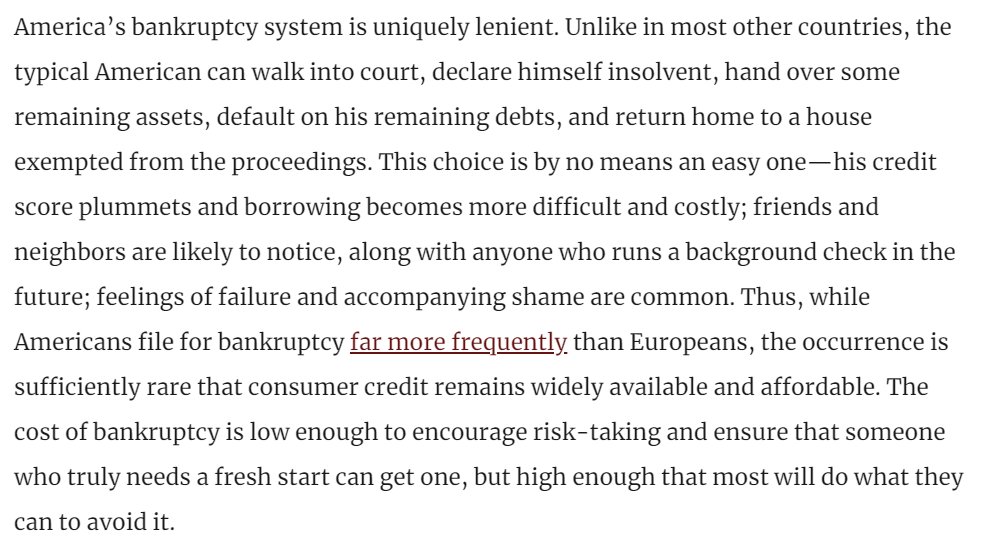
New essay from me: The Banality of Student Loans
How to explain America's bizarre attitudes about student debt, and the policies that promote it? We've foolishly sacralized spending on higher education.
Here's the way out. 🧵americancompass.org/essays/the-ban…
How to explain America's bizarre attitudes about student debt, and the policies that promote it? We've foolishly sacralized spending on higher education.
Here's the way out. 🧵americancompass.org/essays/the-ban…
2/ Young Americans and their families are encouraged to assume whatever student debt necessary -- by not only policymakers, but also a culture that equates the practice with “investing in your future” and institutions that cash the checks upfront and are never held accountable.
3/ In how many movies does the teenager, discovering his family’s financial troubles, concede gloomily that he can abandon his first-choice school and attend the state university nearby, only for a determined parent to insist, no, we will find a way?
4/ The cognitive dissonance between the unquestioned commitment to extravagant spending on higher education and the questionable value of that spending is what yields America’s bizarre discourse around student-loan debt.
5/ On one hand, under the presumption that degrees are precious and consistently produce a high return on investment, American law uniquely excludes student loans from discharge in bankruptcy.
6/ You can run up tens of thousands of dollars of credit card debt taking vacations and walk out of bankruptcy court owing nothing. But the debt you incurred for the life-changing wonders of time on a college campus, that must stay with you indefinitely.
7/ On the other hand, because the debt rests on a foolish and fractured social promise, progressive politicians are now demanding that the government wipe it away altogether -- at the extreme equating its very existence with “violence.”
https://twitter.com/ayannapressley/status/1471858295329771528
8/ Student-debt forgiveness is just a further foolish step down the path of treating higher-ed spending as special, and only compounds the underlying problem. Instead we should make clear that student debt is just, well, debt. Like other debt. Make it dischargeable in bankruptcy. 

9/ Our bankruptcy system does a very good job of offering a fresh start to those who genuinely need one. Leaving the debtor to make the difficult-by-design decision is much preferable to political attempts at sorting borrowers into those deserving and undeserving of help. 

10/ Once we've placed student loans on equal footing with other debt, we should also stop subsidizing and promoting them. The median state's in-state, public university tuition is about $8,000. Offer a Pell Grant to cover half of that. That's it. 

11/ "Oh no, where will students find the other financing they need?" Loaning large amounts of money to teenagers with uncertain prospects and no collateral is a bad idea for lenders because it is a bad idea, period. We shouldn't be finding ways to get those loans issued anyway.
12/ Fortunately, institutions exist that are perfectly positioned to finance tuition, have the right information, and have the right incentives. The universities. If we take away all the subsidies, they'll provide the financing themselves, and be on the hook for results. 

13/ "With loans dischargeable in bankruptcy, subsidies limited to a straightforward grant, and providers responsible for financing the investments they promise to facilitate, the white-washed 'ivory towers' would lose much of their magical allure." americancompass.org/essays/the-ban…
14/ College administrators who say this model would not work are really just admitting that THEIR models do not work, absent a nation entranced by their mystical incantations. Good to know. Let them, not their students, suffer the consequences. The End. americancompass.org/essays/the-ban…
• • •
Missing some Tweet in this thread? You can try to
force a refresh







